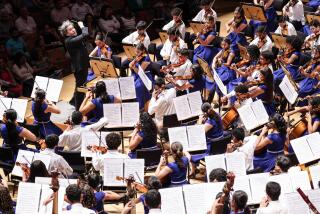Soviet Composer Breathing More Freely in These Days of Perestroika
SAN DIEGO — Composer Vladimir Tarnopolsky survived the repressive Soviet musical establishment by leading a kind of double life.
“They threatened to throw me out of the conservatory, to suspend me for wanting to write what was not allowed,” he said. “After my first year (in the Moscow Conservatory), I had to write one work for myself, then one for the professors’ scrutiny. I wanted to write what I heard in my mind, but there were always restrictions.”
Since perestroika , Tarnopolsky and other Soviet composers have found it easier to ignore the stifling doctrines of Soviet realism, the musical party line enforced by the infamous Soviet Composers Union. This political change has also allowed the 34-year-old Moscow composer to hear his compositions played outside the Soviet Union and to enjoy the acclaim of foreign audiences.
“They didn’t allow me to go out of the country for many years. I was 32 the first time I went abroad. Before then, the only place I could go was Poland.”
Once Tarnopolsky visited Western Europe, he realized that invitations to attend music festivals and conferences had never reached him. The composers union simply kept the nonconforming Tarnopolsky in the dark.
Soviet bureaucracy nearly foiled his efforts to come to San Diego--his first trip to America--to participate in the city’s Soviet arts festival. Although the San Diego Symphony had made all the requisite arrangements for him, the composer was delayed at the last minute by Soviet authorities who suddenly demanded more elaborate travel documents and an additional visa for his overnight stay between planes in London. He persevered and arrived in San Diego on Sunday night, two days later than expected.
Friday night, the San Diego Symphony will give the North American premiere of his “Brooklynsky Bridge,” a work he should have heard last year at Boston’s festival of Soviet and American music.
“I wrote it for the Boston festival, but it was not performed there. Again, I think it was a misunderstanding between perhaps Gosconcert (the Soviet booking agency) and the composers union. I never even found out if I had been invited to Boston.”
Two of Tarnopolsky’s other compositions were performed in Boston, however, including “Jesu, Deine Tiefen Wunden,” a favorably reviewed music theater piece based on the Passion story. Curiously enough, “Brooklynsky Bridge,” his American commission, was given its first performance at London’s Almeida Festival last June, by the visiting Bolshoi Theater Soloists Ensemble.
The composer elaborated on the programmatic American context of his work for soprano, tenor and chamber ensemble. For his text, he chose a cycle of poems by the Soviet writer Vladimir Mayakovsky, who had visited the United States in 1925.
“First of all, I was intrigued by Mayakovsky’s futuristic style, but I also think there are similarities between what Mayakovsky saw in America in the 1920s and what is happening now in the Soviet Union. For instance, there was Prohibition in America in 1920s, and, in the Soviet Union today, there is also a kind of Prohibition. And emigration from the Soviet Union to the United States continues.”
According to Tarnopolsky, “Brooklynsky Bridge” is a four-movement piece whose solemn opening movement combines the Soviet and Russian national anthems. The jazz-like second movement, “Prohibition,” humorously evokes an American speak-easy.
“The final movement is called ‘American Russians,’ based on Mayakovsky’s poem that combines American slang, Yiddish and Russian--the mixture of languages that he heard Russian immigrants speak when he visited America. In this movement I combine American jazz, Russian folk songs and Gypsy folk songs,” he said.
If Tarnopolsky’s descriptive tone poem sounds more conventional than many contemporary American avant-garde trends, the lack of electronic equipment for composition in the Soviet Union is partly responsible.
“I attended an electronic music seminar in 1988, but in Moscow there’s no studio for electronic work. It is my dream one day to do electronic music.”
While Tarnopolsky is in San Diego, he plans to visit UC San Diego’s Center for Music Experiment, one of the world’s leading research centers for electronic and computer music.
The symphony performance will be repeated at 8 p.m. Saturday and at 2 p.m. Sunday. Also on the program is the world premiere of a work by American composer Joseph Schwantner that was commissioned for the arts festival. The program also includes works by J. S. Bach, Tchaikovsky and Stravinsky.
More to Read
The biggest entertainment stories
Get our big stories about Hollywood, film, television, music, arts, culture and more right in your inbox as soon as they publish.
You may occasionally receive promotional content from the Los Angeles Times.










